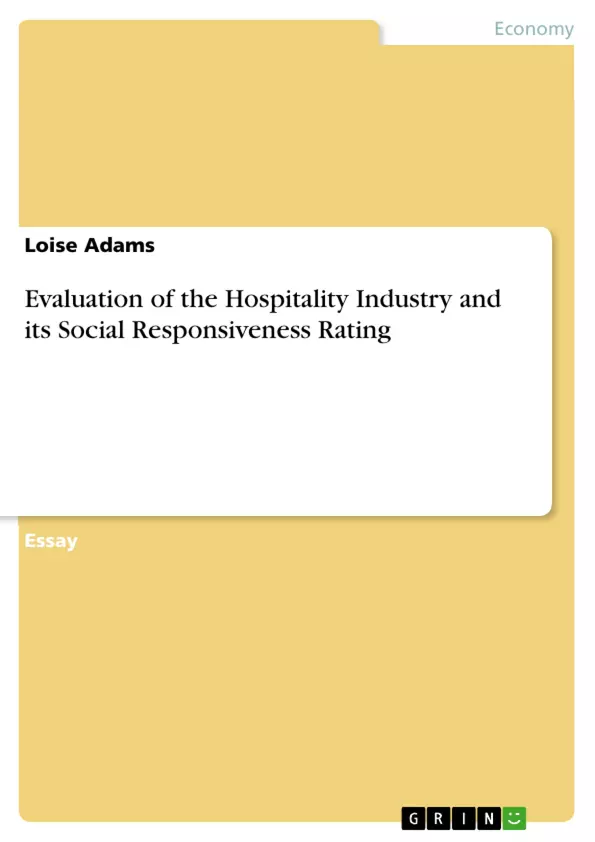This paper is an evaluation of the hospitality industry and its social responsiveness rating and how this is essential in understanding the industry's history, background, and various sectors. The hospitality industry encompasses businesses that provide services and goods focused on customer satisfaction and leisure needs. These sectors include travel and tourism, food and beverages, lodging, and recreation. The industry's stakeholders, including employees, suppliers, consumers, government, activists, and communities, have their own issues that need to be addressed. Consumers seek value for their money and increasingly demand ethical practices from businesses. Suppliers play a crucial role in providing raw materials to sustain industry activities. The government ensures ethical practices and protects stakeholders. Environmental and political groups advocate for the protection of the environment.
The hospitality industry plays a significant role in social, economic, and political settings. Socially responsible businesses attract consumers and employees by actively contributing to the community's well-being. Eco-friendly initiatives, community service, and charitable contributions are ways in which the industry fulfills its social responsibilities. Economically, the industry generates employment, supports local farmers, and serves as a revenue source for governments. Politically, it advocates for peaceful environments and shapes political climates in countries relying on tourism. Ethics in the hospitality industry guide strategic goals and ensure acceptable conduct at all business levels. Ethical practices promote job and customer satisfaction. Morals and ethics, such as integrity, honesty, and responsibility, govern interactions with stakeholders. Environmental impacts are a concern, as the industry relies on natural resources and contributes to climate change and resource depletion. Green practices, waste management, and environmental conservation efforts are undertaken to mitigate these impacts. Social issues in the hospitality industry include fair employee treatment, customer satisfaction, protection of fauna and flora, and community development. Fair wages and working conditions are essential for employees, and customer satisfaction drives industry success. Environmental stewardship and community engagement are also important social considerations.
Inhaltsverzeichnis (Table of Contents)
- A History and Background
- Corporate stakeholders and response to their issues.
- The role of the industry in its social, economic, and political setting
- Domestic and International Ethics.
- Ecological and natural resources
- Social Issues..
- Hospitality industry's overall social responsiveness and rating in relation to the Saint Leo University core values and what is needed to be done to align them with the core values .......
Zielsetzung und Themenschwerpunkte (Objectives and Key Themes)
This text aims to analyze the hospitality industry's role in its social, economic, and political setting, focusing on the industry's responsibility to its stakeholders, the environment, and local communities.
- The history and background of the hospitality industry
- The relationship between the hospitality industry and its stakeholders
- The social responsibility of the hospitality industry
- The ethical considerations within the hospitality industry
- The impact of the hospitality industry on the environment
Zusammenfassung der Kapitel (Chapter Summaries)
- A History and Background: This chapter introduces the definition and scope of the hospitality industry, outlining its key sectors, including food and beverages, travel and tourism, recreation, and lodging. It discusses the diverse aspects of these sectors and their interconnectedness.
- Corporate stakeholders and response to their issues: This chapter examines the various stakeholders within the hospitality industry, including employees, suppliers, consumers, government, activists, communities, and environmental groups. It explores the interests and challenges faced by each stakeholder group, highlighting the need for ethical and responsible practices in the industry.
- The role of the industry in its social, economic, and political setting: This chapter delves into the social responsibility of the hospitality industry, emphasizing the importance of businesses engaging in positive social impacts and contributing to the wellbeing of their communities. It discusses the growing trend of socially conscious consumerism and the need for companies to be transparent about their social and environmental practices. This chapter also explores different ways the hospitality industry can play a social role, including eco-friendly initiatives, community service, and charitable contributions.
Schlüsselwörter (Keywords)
The primary keywords and focus topics of this text include: hospitality industry, stakeholders, social responsibility, ethical practices, environmental impact, community engagement, eco-friendly initiatives, socially conscious consumerism, corporate social responsibility.
- Quote paper
- Loise Adams (Author), 2020, Evaluation of the Hospitality Industry and its Social Responsiveness Rating, Munich, GRIN Verlag, https://www.hausarbeiten.de/document/1364895


